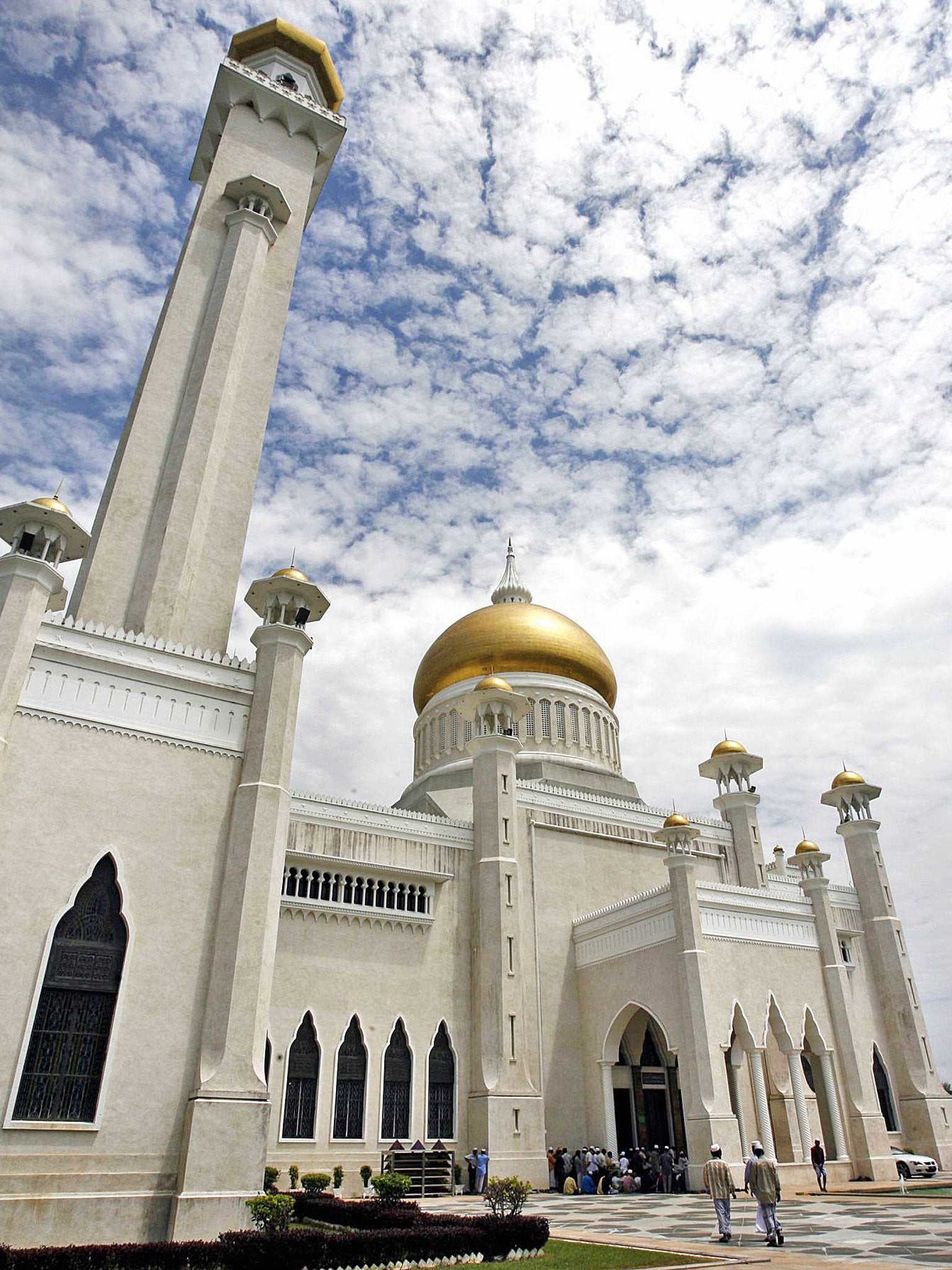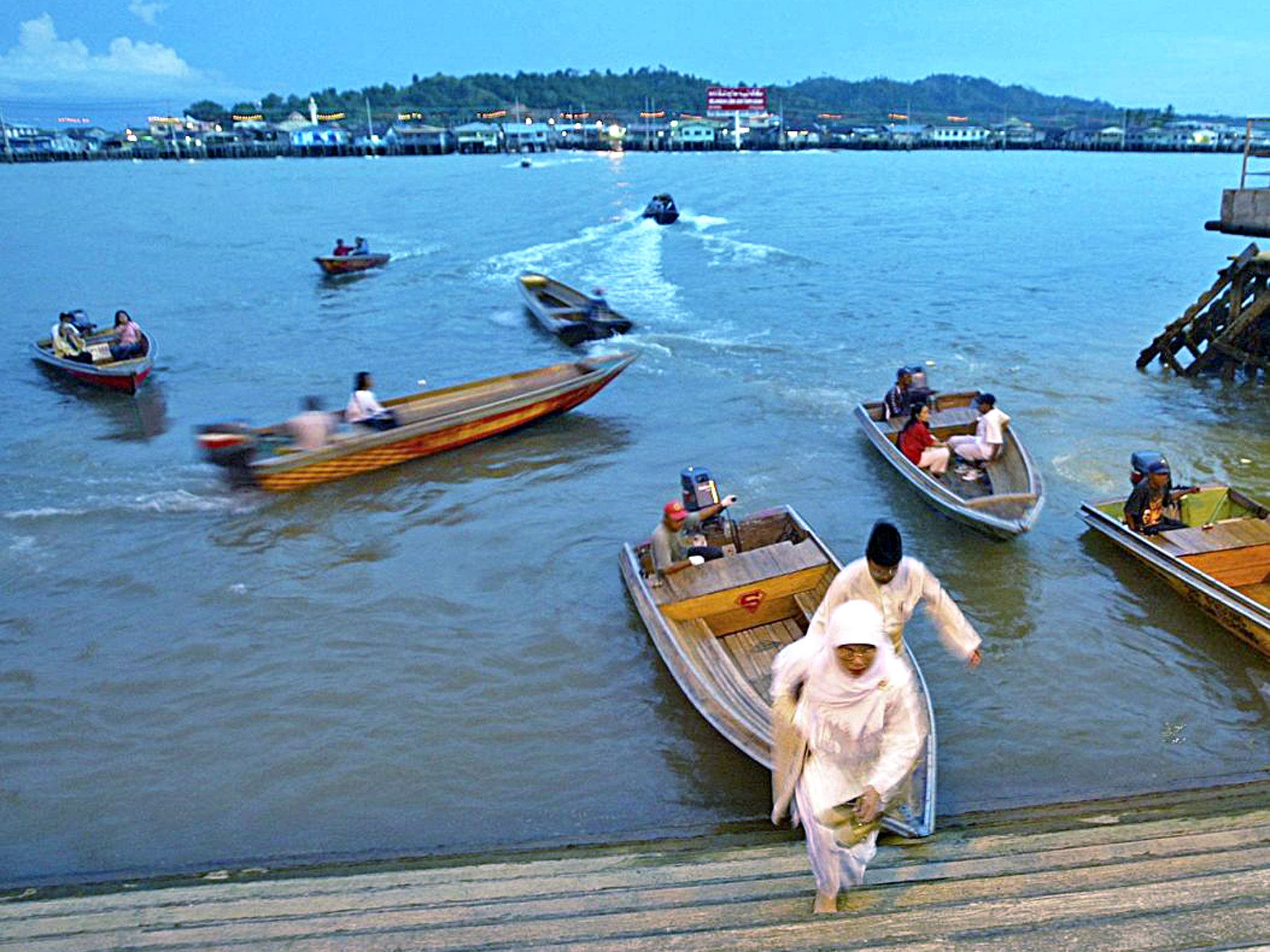Brunei: A kingdom of gold and green
Oil wealth has transformed this tiny sovereign state on Borneo but, as Nick Boulos discovers, it remains a place of exotic wildlife and cherished traditions

Your support helps us to tell the story
From reproductive rights to climate change to Big Tech, The Independent is on the ground when the story is developing. Whether it's investigating the financials of Elon Musk's pro-Trump PAC or producing our latest documentary, 'The A Word', which shines a light on the American women fighting for reproductive rights, we know how important it is to parse out the facts from the messaging.
At such a critical moment in US history, we need reporters on the ground. Your donation allows us to keep sending journalists to speak to both sides of the story.
The Independent is trusted by Americans across the entire political spectrum. And unlike many other quality news outlets, we choose not to lock Americans out of our reporting and analysis with paywalls. We believe quality journalism should be available to everyone, paid for by those who can afford it.
Your support makes all the difference.Amat wasn't expecting company when we popped in, but she's quite used to spontaneous guests. The last person to stop by unannounced at her longhouse in the jungles of eastern Brunei was the Sultan. "I was in my pyjamas doing the washing up and I looked up to see him standing in the doorway," she laughed. "I rushed off to get changed without even offering him a cup of tea."
I had come to meet the native Iban tribe, who continue to live in traditional narrow houses accommodating up to 18 families, but the Sultan was apparently just doing the rounds. Hassanal Bolkiah has full executive authority over this conservative Islamic state, and His Majesty has a habit of popping up unexpectedly. Most, if not all, the state's 415,000 citizens have met him – a fact that they are only too keen to mention at any opportunity.
But for the wider world, this petit 67-year-old with a goatee and some of the deepest pockets on the planet is often the only point of reference for this oil-rich country. On home turf, he has been elevated to almost godly status. His face beams down from every shop and restaurant; he's front-page news nearly every day, and people queue for hours every year on his birthday, just to shake his hand.
Of course, Brunei, located on the northern coast of Borneo, is much more than one man. Within its tiny borders (the country is slightly smaller than Devon) are ancient tribes and rare wildlife, fine Islamic architecture and lodges lost in the jungle.
I began in the capital, Bandar Seri Begawan, a compact city dominated by two majestic mosques. The most glittering of these, with fountains, gates adorned with rubies and 29 golden domes that represent each of Brunei's rulers, is Jame'Asr Hassanil Bolkiah. Built in the 1990s on the orders of the Sultan, it cost an estimated US$1bn. So, it seems only fair that he gets his own private escalator. After being presented with a full-length robe, I entered the hushed prayer hall and stood under the vast domed ceiling, marvelling at the geometric patterns on the walls.
Later, I strolled through the canalside Kianngh Market, where demure women in headscarves smashed coconuts in half, then past the incense-infused Chinese temple towards the National Library. Scrawled across its exterior was a colourful mural depicting Brunei past and present. In one corner, dancing masked shamans, in the other: oil rigs.
The country's fortunes changed overnight with the discovery of oil in 1929. The good times have rolled ever since, particularly after the former British protectorate gained its independence in January 1989. Today, Brunei's people are free of income tax and enjoy free education and healthcare. A litre of petrol costs the equivalent of just 20p. No wonder the sultan is so popular.
"He's a very humble man," insisted a passerby. "I was very nervous when I met him but there's a kindness in his eyes," she added, whipping out her phone to show me her selfie with him.
You have to wonder how humble a man can be whose wealth and tastes are so extravagant. The stories are legendary: 6,000 cars including a gold-plated Rolls-Royce; polo ponies with air-conditioned stables; his own 747 airliner (which he pilots himself) modified with Italian marble; and a rumoured habit of racing his Ferraris on the streets of Bandar after midnight.
A fraction of the Sultan's treasures are on show at the Regalia Museum, an Aladdin's cave of priceless trinkets. Among the most impressive pieces is a solid gold arm with an upturned palm – used by the Sultan to support his chin during his 1968 coronation in which he wore a 3kg crown. There's also his chariot, pulled through the streets by 48 men while he waved to the crowds from his tiger-skin throne.
It's easy to step away from all this gilded excess though. Across the choppy Brunei River is Kampong Ayer, a sprawling water village with thousands of ramshackle homes perched on stilts like matchboxes. I hailed a water taxi, driven by a chap called Yul whose name was shaved into the side of his head, and he sped past fathers and sons fishing from the wobbly piers. "Fishing used to be the main industry here but it's merely a hobby now," said Tom, my guide.
Archaeological finds date the first settlers to around 1,000 years ago. Back then, homes were built using nibong palms. Centuries later, during the height of the Brunei Empire up until the end of the 1800s, Kampong Ayer was the seat of government. It took its present form during the next 150 years, with houses growing as needed – extra rooms added here and there. Tom and I walked along the web of boardwalks past families who offered up barbecued baby clams, gathered that morning during low tide. (Serving suggestion: swallow whole with soy sauce and fresh chilli.)
New infrastructure has transformed Kampong Ayer into a sub-city in its own right, with mosques, schools and shops. There's even a football stadium and, most crucially, a fire brigade. However, with countless wooden structures packed so tightly together, fires still spread fast.

Sitting outside her blue and green house-turned-canteen (you knock on the door for a plate of chicken and rice) was Miyah Robiah. Growing up here in the Sixties, when markets would float past on boats, she knows the horrors only too well. "My old house was one of 100 that went up in flames. We ran with nothing but our coats," she said. "We were offered housing in the city but I didn't want to leave the water village. We are a community and my children can still fish and hunt for crabs after school."
Again, the Sultan is never far away. Just visible in the distance beyond some tall trees downstream was Istana Nurul Iman, the world's largest palace. It's three times the size of Buckingham Palace with 1,788 rooms, a heady confection of Asian-style hip-and-gabled rooftops alongside a bulbous golden cupola.
My own accommodation was similarly palatial. In fact, for the briefest of moments I thought the taxi driver had taken a wrong turn towards the Sultan's abode as we swept up the long driveway at the Empire Hotel and Country Club, just outside Bandar. The lobby – all gold, tiger's eye gems and Swarovski chandeliers – opened up to a cavernous atrium supported by solid marble columns more than 50m tall, so prodigious that they blocked the Wi-Fi.
Similar levels of luxury extend throughout the 522 rooms, though nothing quite beats the views of the beach and South China Sea. Bill Clinton and Prince Charles have stayed here – separately – in the 7th floor Emperor Suite, complete with gold-threaded carpet and a 10m indoor swimming pool. It can be yours, too, for a mere £8,000 per night.
It was, in every sense, a palace fit for a prince. So it came as no surprise to hear that it was originally built as the residence of the Sultan's younger brother, Jefri, until 1997 the country's minister of finance.
Gold may well be the colour of Brunei but, so, too, is green. Later, a few miles west of Bandar, on snaking riverways, I found myself cruising slowly in search of endangered proboscis monkeys. Only found on the island of Borneo, they're famed for their comically large and protruding noses. "Experts think they help attract females. The bigger, the better," said Tom. The river was quiet, only a lone fisherman and a few fluttering kingfishers to be seen in the distance. Then, after another wide bend, we delved deep into a mangrove clearing and cut the engine.
A large male soon sauntered into view, crawling along a branch overhead. He was followed by two somersaulting infants. The animals seem undaunted by our presence, but Tom seemed jittery, shifting on his feet anxiously. "According to an old superstition, if a proboscis monkey pees on you, you'll go bald," he explained. I swiftly repositioned myself.
The illuminated golden domes of Bandar shone brightly against the darkening sky when we arrived back. There's little in the way of nightlife in Brunei. Being an Islamic state, alcohol is forbidden here; bars and clubs simply don't exist. But there is Gadong Night Market.
Bare light bulbs swung over spitting woks; flames shot high from stalls laden with weird and wonderful delicacies. Some locals slurped on spicy soup noodles, others queued for curried goat. Strangely, there was no such queue for the skewers of honey-coated chicken anuses and nor did I intend to form one.
The drive back took us past the Sultan's palace. The traffic lights outside suddenly turned red: a tell-tell sign of an imminent royal arrival or departure. A second or two later, the heavy iron gates opened and a fleet of cars sped out in a flash. There was no way of knowing which royal had just zoomed away – but if they fancied a spot of Ferrari racing, they'd certainly picked a nice night for it.
Travel essentials
Getting there
Royal Brunei Airlines (020 7584 6660; flyroyalbrunei.com/uk) operates a Dreamliner service to Brunei from Heathrow via Dubai. Return flights start at £695.
Premier Holidays (0844 493 7940; premierholidays.co.uk/brunei) offers four nights at the Empire Hotel & Country Club and return flights from Heathrow with Royal Brunei Airlines from £1,449pp, including transfers, city tour and excursions.
Staying there
The Empire Hotel & Country Club (00 637 241 8888; theempirehotel.com). Doubles from B$400 (£192) including breakfast.
The Brunei Hotel (00 673 224 4828; thebruneihotel.com). Doubles from B$229 (£110) including breakfast.
More information
Join our commenting forum
Join thought-provoking conversations, follow other Independent readers and see their replies
Comments